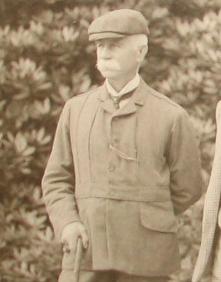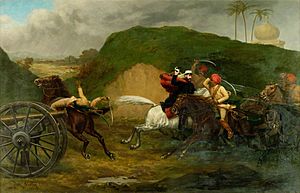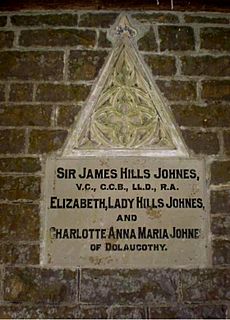James Hills-Johnes facts for kids
Quick facts for kids
Sir James Hills-Johnes
|
|
|---|---|

Sir James Hills-Johnes c. 1900s
|
|
| Birth name | James Hills |
| Nickname(s) | Jemmy |
| Born | 20 August 1833 Neechindipur, British India |
| Died | 3 January 1919 (aged 85) Dolaucothi Estate, Carmarthenshire, Wales |
| Buried |
Caio, Carmarthenshire
|
| Allegiance | United Kingdom |
| Service/ |
Bengal Army British Indian Army |
| Years of service | 1853–1888 |
| Rank | Lieutenant General |
| Unit | Bengal Horse Artillery Royal Artillery |
| Commands held | 3rd Division, Northern Afghanistan Field Force Military Governor of Kabul Kohat District Peshawar Mountain Battery |
| Battles/wars | Indian Mutiny Abyssinian War Lushai Expedition Second Anglo-Afghan War |
| Awards | Victoria Cross Knight Grand Cross of the Order of the Bath Mentioned in Despatches (4) |
| Relations | William George Cubitt VC (brother-in-law) Lewis Pugh Evans VC (nephew) |
Lieutenant General Sir James Hills-Johnes (born August 20, 1833 – died January 3, 1919) was a very brave officer in the British Indian Army. He received the Victoria Cross, which is the highest award for courage in battle. This award is given to British and Commonwealth soldiers who show great bravery against the enemy.
Contents
Early Life
James Hills was born on August 20, 1833, in Neechindipur, Bengal, India. His parents were James and Charlotte Hills. He went to school in Edinburgh, Scotland. He studied at the Edinburgh Academy and the Edinburgh Institution. Later, he attended the Addiscombe Military Seminary. In 1853, he became an officer in the Bengal Artillery.
In 1882, James Hills changed his last name to Hills-Johnes. He did this when he married Elizabeth Johnes. She was the daughter of John Johnes from the Dolaucothi Estate in Wales.
A Brave Soldier: His Military Career
James Hills was a young second lieutenant in the Bengal Horse Artillery. This was during the Indian Mutiny in 1857. On July 9, 1857, a very brave event happened at the Siege of Delhi. For his actions, he and Henry Tombs were given the Victoria Cross.
Earning the Victoria Cross
Here is why Lieutenant Hills and Lieutenant-Colonel Tombs received the Victoria Cross:
Lieutenant-Colonel Henry Tombs, C.B., and Lieutenant James Hills
Date of Act of Bravery, 9 July 1857
For very gallant conduct on the part of Lieutenant Hills before Delhi, in defending the position assigned to him in case of alarm, and for noble behaviour on the part of Lieutenant-Colonel Tombs in twice coming to his subaltern's rescue, and on each occasion killing his man. (See despatch of Lieutenant-Colonel Mackenzie, Commanding 1st Brigade Horse Artillery, dated Camp, near Delhi, 10 July 1857, published in the Supplement to the London Gazette of 16 January 1858.)
Besides the medal for the Indian Mutiny, Hills also received a special award for his part in the Siege of Lucknow. He helped clear the area around Lucknow from November 1857 to March 1858.
Later Campaigns and Promotions
After the Indian Mutiny, Hills took on several important roles. He served as an artillery officer in the Abyssinian campaign (1867–68). He also fought in the Lushai Expedition (1871–72).
In July 1879, he was promoted to major-general. He then fought in the Second Anglo-Afghan War (1878–80). In October 1879, he became the military governor of Kabul. He also commanded a division in 1880. For his service in Afghanistan, he was made a Knight Commander of the Order of the Bath (KCB) in March 1881.
Hills-Johnes was promoted to lieutenant-general in January 1884. He retired from the army in 1888. In June 1893, he was made a Knight Grand Cross of the Order of the Bath (GCB). This was a very high honor.
Life After the Army
After retiring, Hills-Johnes continued to serve his community. He was the High Sheriff of Carmarthenshire in 1886. In 1910, he was made an honorary freeman of the town of Carmarthen. He also served as a member of the Carmarthenshire County Council.
On February 25, 1891, he became an Honorary Colonel of the Royal Carmarthen Artillery. This was a local Militia unit. He was a close friend of Lord Roberts. In 1900, he joined Lord Roberts during the South African War.
Sir James Hills-Johnes died on January 3, 1919, at the age of 85. He passed away from influenza during a pandemic. He was buried at Caio, Carmarthenshire, near his home at the Dolaucothi Estate.
Family and His Legacy
Sir James Hills-Johnes had five brothers and four sisters. His brothers included Major-General Sir John Hills. Another brother, Robert Hills, was a first-class cricketer. Robert Hills was also the brother-in-law of Lieutenant William George Cubitt VC and uncle of Brigadier Lewis Pugh Evans VC.
Today, Sir James Hills-Johnes's medals, including his Victoria Cross, are on display. You can see them at the Royal Artillery Museum in Woolwich, London.
 | Claudette Colvin |
 | Myrlie Evers-Williams |
 | Alberta Odell Jones |



